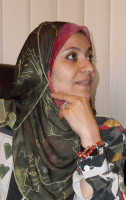Sunday October 27, 2013
BY SALMA EL SAEED
Since the Ministry of Education removed sexual health lessons from the public curriculum in 2010, many students lack general knowledge with regards to sexual issues. According to an annual report Google released in 2011 outlining the most popularly searched topics worldwide, Egypt ranked fourth in countries that Google-searched the word “sex.”
In Nov. 2012, Alexa, a web service that tracks Internet traffic patterns worldwide, reported at least five pornographic websites being among the 100 most visited websites in Egypt. It is a misconception that students who attend private schools are an exception to this; they are just as prone to a lack of sexual education as those who attend public schools.
Lara Al Huneidi, a junior majoring in Communication and Media Arts at AUC, said that her teachers did not teach or even mention sexual education in class, although she went to an international private school. She said her knowledge in sexual issues came from sources outside of the classroom such as friends or family.
Mohamed Hussein, a Mechanical Engineering junior at AUC, said that his classes in high school covered the basic tenets of reproduction.
“We were given basic information in biology class, like the reproductive process and the organs involved,” Hussein said.
The Egyptian society’s conservative nature has caused issues related to sex to be viewed as taboo or religiously inappropriate. Al Huneidi also sees a reciprocal relationship between the lack of sexual education and the sensitivity of the topic in Egypt. “The lack of sexual education has made the subject of sex really sensitive and this makes it harder to introduce sexual education,” she said, adding, “It becomes a cycle.” Heba Kotb, sexologist, said that sex education should be taught in Egypt bu within the limits of what is culturally, religiously, and age-appropriate. “There’s no point in teaching middle-school students about sexually transmitted diseases because they aren’t sexually active at this age,” Kotb said.
She added that sexual education should be introduced at varying levels, beginning with basic information about human physiology and the functions of male and female reproductive organs at the middle school level, followed by further exposure to the concepts of sex and sexuality at the high school level. Married couples can then have access to more in-depth information about the sexual process and sexually transmitted diseases.
Nelly Safty, a teacher at Port Said American School, said that students should not be exposed to sexual education during their school years.
“They simply aren’t mature enough to be exposed to and discuss such topics,” said Safty, adding that an appropriate time for sexual education is during college years. Kotb also emphasized that, since the cultural and religious norm is to only have sex within a marriage, only married couples should be given in-depth sexual education.
“Sexual education should definitely be a part of school curriculum but educators should be wary of religious boundaries,” said Nagla Assal, a General State Supervisor at the Egyptian Language School. Assal added that since the topic is extremely sensitive in Egypt, schools that teach sexual education should keep male and female students separate during these lessons, as a co-ed lesson would be too uncomfortable. Nevertheless, some people agree that steps should be taken towards normalizing the discussion of sexual topics in Egyptian society, regardless of the age level. “Although it’s considered taboo to speak about sex in Egypt, we all need to realize and admit that everybody has sexual needs and providing people with sexual education will at least help them practice safe sex,” Hussein said.
According to a report issued in 1994 by the United Nations Conference on Population and Development, the Egyptian Ministry of Education incorporated a few short lessons on sexuality and reproductive health in the public school curriculum. When the Ministry removed those lessons from the public curriculum, it stated that they would be replaced with in-class discussions.
Kotb commented on the issue of teachers not following through with sexual education lessons, saying that an integral part of the initiative to reintroduce this topic into school curriculum is to employ professional and efficient teachers to disseminate the information. This step will allow students to effectively receive all the necessary information, as well as decrease the sensitivity of the topic.
